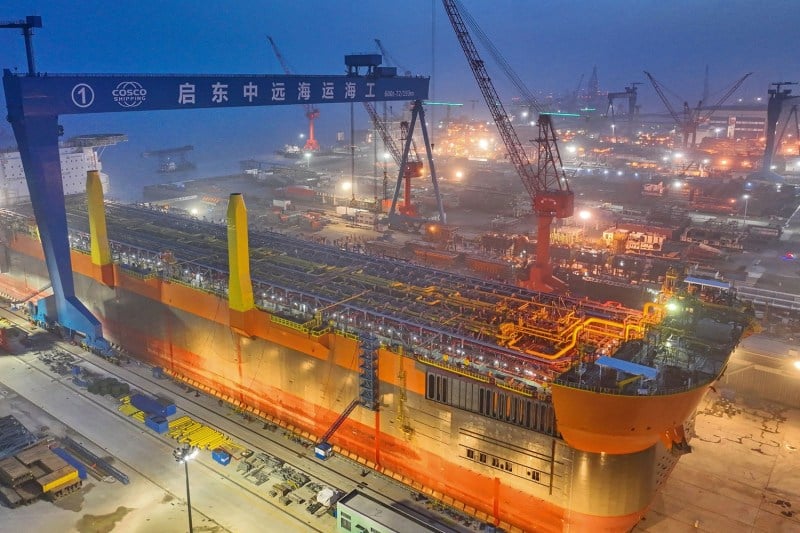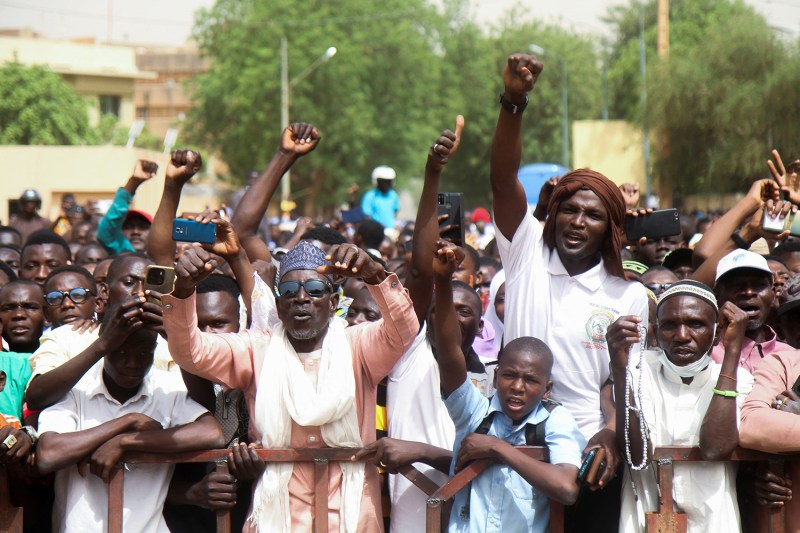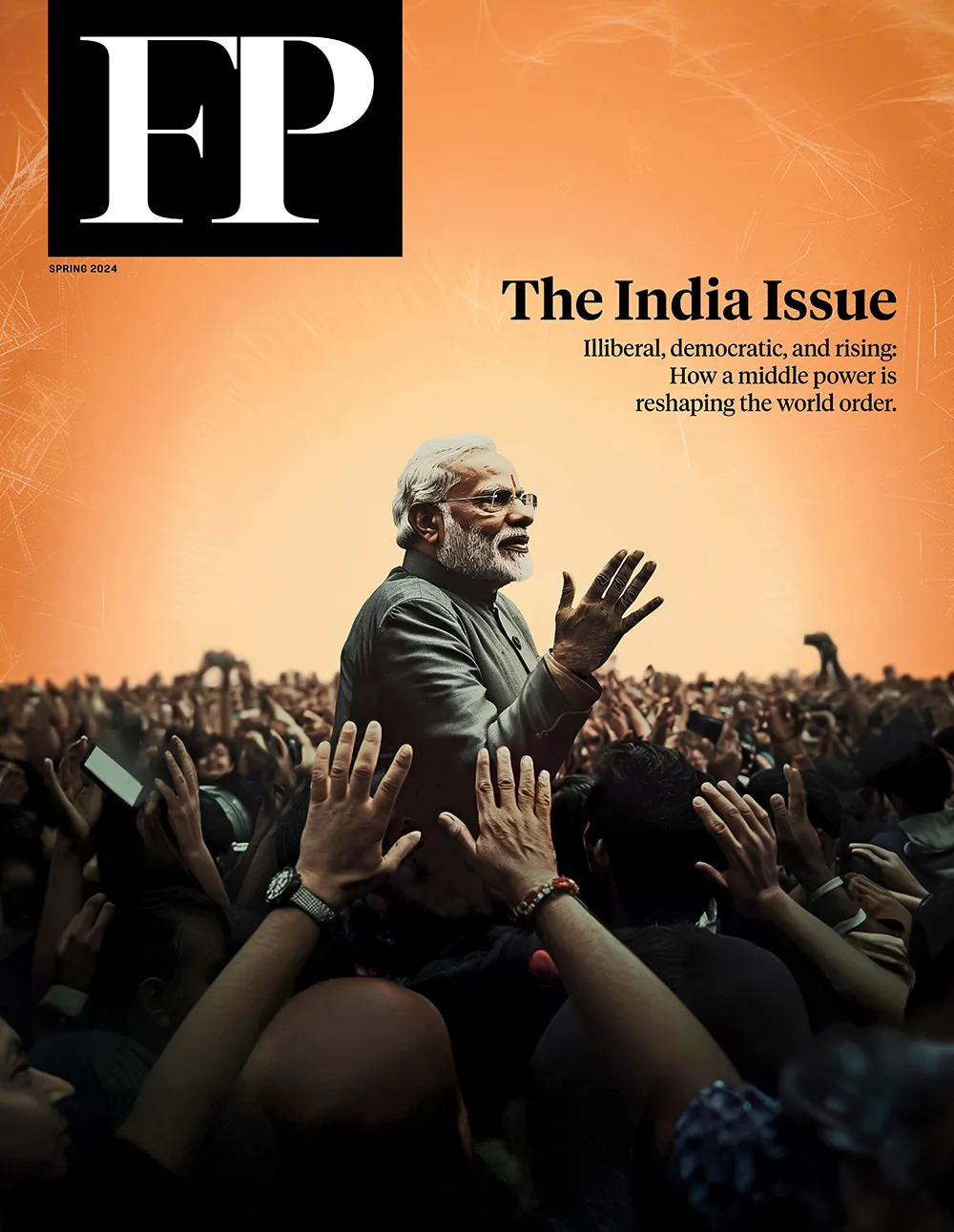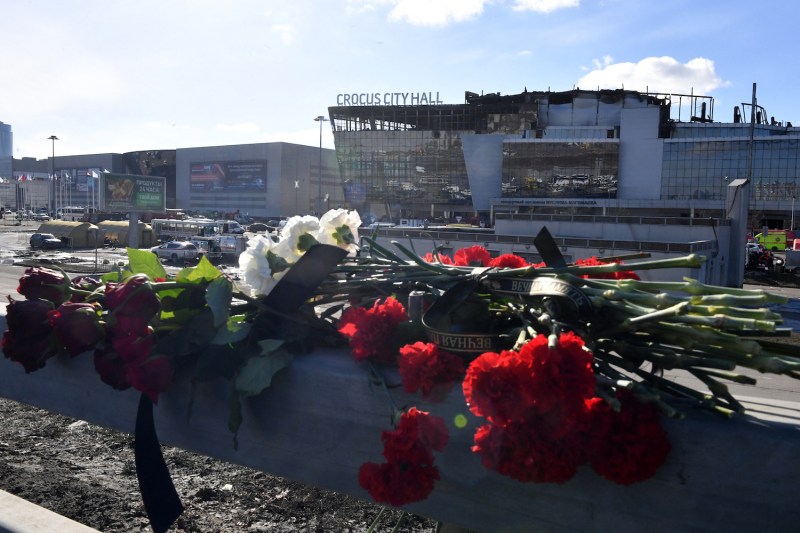Moscow Terrorist Attack Undercuts Putin’s Strongman Image
Russia’s security services are stretched, distracted, and politicized, experts say.
The terrorist attack by the Islamic State on a sold-out concert on the outskirts of Moscow on Friday was the deadliest to hit Russia in almost two decades, killing at least 143 people. Yet for many, the assault on the Crocus City Hall evoked memories of the 2000s, when terrorist attacks—often with soaring death tolls—were a regular occurrence in Russia.
The terrorist attack by the Islamic State on a sold-out concert on the outskirts of Moscow on Friday was the deadliest to hit Russia in almost two decades, killing at least 143 people. Yet for many, the assault on the Crocus City Hall evoked memories of the 2000s, when terrorist attacks—often with soaring death tolls—were a regular occurrence in Russia.
Russian President Vladimir Putin came to power shortly before the turn of the century, as Moscow was waging a brutal campaign to quash violent extremism and separatism in the restive North Caucasus republic of Chechnya. The war propelled Putin to prominence, and he staked his presidency on stamping out the terrorist threat. “We will pursue them everywhere,” he said in the wake of a series of apartment block bombings in 1999. “We’ll catch them in the toilet. We’ll wipe them out in the outhouse.”
Despite Putin’s bellicose rhetoric, militants from the North Caucasus continued their attacks across Russia throughout the first decade of the 21st century, bombing public transit and airplanes as well as laying siege to a Moscow theater. In one of the most violent incidents, Chechen militants seized a school in the town of Beslan, taking more than 1,000 people hostage—most of them children—over three days in 2004. The standoff ended when Russian forces stormed the school, and 334 people were killed. A European Court of Human Rights ruling later criticized Russia for failing to act on intelligence that an attack was planned for the region and for using “indiscriminate” weapons such as tank cannons in storming the school, likely driving up the death toll.
The threat began to recede in the 2010s, and the Kremlin’s preoccupation with Ukraine came to the fore. But Friday’s attack has revealed Russia’s continued vulnerability to terrorist violence. And it has resurfaced questions about the security services’—and, by extension, Putin’s—ability to protect citizens from it.
Russia’s Federal Security Service (FSB) is responsible for domestic security and intelligence. It also serves as the Kremlin’s primary intelligence service across the former Soviet Union and played a prominent role in planning the invasion of Ukraine.
“The reason the FSB didn’t see this coming is not because the FSB is incapable,” said Kevin Riehle, who spent three decades working in U.S. intelligence and is the author of a new book on the history of the FSB. “The reason is that they’re looking elsewhere.”
As the Kremlin has steadily cracked down on dissent and civil society over the past decade, the FSB’s remit has ballooned. Russian courts have branded more than 14,000 people and entities as extremist, including opposition movements; Jehovah’s Witnesses; Facebook’s parent company, Meta; and, most recently, the “LGBT movement,” putting the organizations on par with groups such as al Qaeda. And it’s the FSB’s job to keep tabs on all of them.
This expansive workload has likely stretched the agency’s resources, said Andrei Soldatov, a Russian journalist and an expert on the security services. It also speaks to the FSB’s long-standing role in monitoring not only conventional security threats but also perceived challenges to Russia’s leadership. “The demand that the FSB be loyal to no one but the president has been in existence since before Putin came along as president,” Riehle said. “That was the demand of [former President Boris] Yeltsin in the 1990s.”
Politicization of the security services can also impede their ability to report unflattering or inconvenient truths to senior officials.
The United States sought to warn Russia about intelligence it had of a planned attack in Moscow targeting large gatherings, including concerts, according to a statement issued by the White House in the wake of the attack on Friday. Three days before the attack, Putin publicly dismissed Western warnings as “blackmail” and an effort to destabilize the country.
“Think about an officer of the FSB who got this warning and now it’s his job to pass it on to his superiors,” Soldatov said. “First of all, he would be thinking about his own safety, that he would not be accused of being a traitor or too close to the Americans.”
In the wake of the 9/11 attacks, Putin was the first world leader to call U.S. President George W. Bush to offer his condolences, pitching Russia and its fight in Chechnya as part of the wider war on terrorism. But former CIA officers note that cooperation on counterterrorism between Russia and the United States has always been poor and riven with suspicion. Douglas London, a retired CIA senior operations officer, recalled in an interview that Russian officials would accuse the United States of inventing the Islamic State during meetings.
Experts and former U.S. intelligence officials described the FSB as a blunt-force instrument that has had its uses for the Kremlin over the years but may have impeded it when it came to the more delicate aspects of intelligence gathering and counterterrorism efforts. “The idea of patiently cultivating insiders and agents is not how they go,” London said.
Now, having failed to stop Friday’s brazen attack, some in Russia are openly questioning Putin’s vast security apparatus. “What happened is unique in that for the first time in Russia, during a terror attack of this scale, security forces were unable to prevent the terrorists’ action in any way: they freely entered the building, killed and wounded scores of people, and calmly left the scene of the massacre,” political analyst Vladislav Inozemtsev wrote in a commentary. “Years of tightening security and trillions of rubles were spent in vain.”
Maria Pevchikh, an associate of the late opposition figure Alexei Navalny, accused the security agencies of being “too busy fighting politicians, activists, and journalists, so they didn’t have time left to deal with terrorists.”
U.S. officials have attributed the attack to a branch of the Islamic State based in Afghanistan, known as the Islamic State-Khorasan, which claimed responsibility and released video purportedly taken during the assault by one of the alleged perpetrators. The Sunni group’s propaganda arm has set its sights on Russia in recent years due to the Kremlin’s deepening ties with Shiite Iran as well as Moscow’s role in the Syrian civil war, pounding Sunni enclaves with airstrikes as Russia came to the aid of President Bashar al-Assad. The Assad family is Alawite, an offshoot of Shiism.
The Islamic State “perceives Russia as the vanguard of Shia Islam at this point,” Colin P. Clarke, the director of research at the Soufan Group, said during an FP Live event on Tuesday. “The Russians have also been accused of spilling a lot of Muslim blood going all the way back to the Soviet invasion of Afghanistan, from 1979 to 1989, and then the brutal wars in the North Caucasus.”
Russia is “extremely vulnerable” to further attacks by the group, said London, the retired CIA officer. Four men charged with carrying out Friday’s attack are Tajik citizens, according to Russian state media. Tajikistan shares a lengthy border with Afghanistan, and the Islamic State has sought to recruit militants from local extremist groups in the country as well as in other Central Asian countries.
Citizens of Tajikistan can travel to and stay in Russia visa-free for up to 90 days, and the country is host to a large diaspora of some 1.3 million Tajiks. Many are now bracing for a backlash from both the authorities and Russian citizens in the wake of Friday’s attack.
“The FSB is not going to handle this with more finesse than it handled those early 2000s attacks. And it’s going to create some frightened and angry people who will be vulnerable to recruitment,” Riehle said. “It will make things worse.”
Amy Mackinnon is a national security and intelligence reporter at Foreign Policy. Twitter: @ak_mack
More from Foreign Policy

Arab Countries Have Israel’s Back—for Their Own Sake
Last weekend’s security cooperation in the Middle East doesn’t indicate a new future for the region.

Forget About Chips—China Is Coming for Ships
Beijing’s grab for hegemony in a critical sector follows a familiar playbook.

‘The Regime’ Misunderstands Autocracy
HBO’s new miniseries displays an undeniably American nonchalance toward power.

Washington’s Failed Africa Policy Needs a Reset
Instead of trying to put out security fires, U.S. policy should focus on governance and growth.








Join the Conversation
Commenting on this and other recent articles is just one benefit of a Foreign Policy subscription.
Already a subscriber? .
Subscribe Subscribe
View Comments
Join the Conversation
Join the conversation on this and other recent Foreign Policy articles when you subscribe now.
Subscribe Subscribe
Not your account?
View Comments
Join the Conversation
Please follow our comment guidelines, stay on topic, and be civil, courteous, and respectful of others’ beliefs.